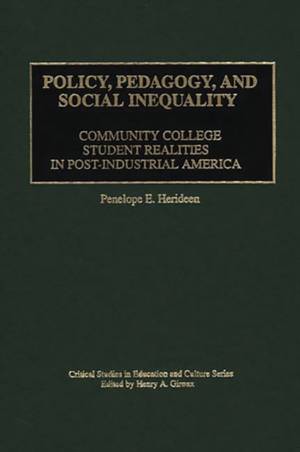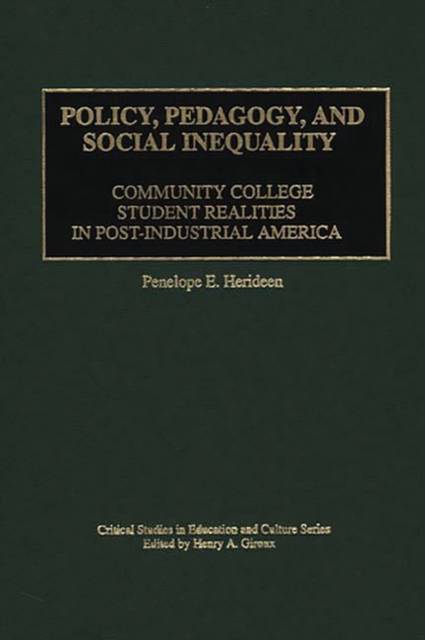
- Afhalen na 1 uur in een winkel met voorraad
- Gratis thuislevering in België vanaf € 30
- Ruim aanbod met 7 miljoen producten
- Afhalen na 1 uur in een winkel met voorraad
- Gratis thuislevering in België vanaf € 30
- Ruim aanbod met 7 miljoen producten
Policy, Pedagogy, and Social Inequality
Community College Student Realities in Post-Industrial America
Penelope E HerideenOmschrijving
Drawing extensively from critical educational theory, feminist perspectives and the writings of community college insiders as well as from her three years of classroom research, Professor Herideen develops the concept of Critical Mainstreaming. This educational model transcends traditional dichotomies such as vocational vs. liberal arts education and educating for critical consciousness vs. training for upward mobility. Critical Mainstreaming provides a unique pedagogy designed to maximize educational and career success for nontraditional students. Her work challenges the current wave of higher educational reform proposed by policymakers such as President Clinton and former Secretary of Labor Robert Reich by showing the limitations of the human capital model for education. Dr. Herideen proposes structural and instructional innovations so that educators, administrators, and policymakers can remedy rather than reproduce existing social inequities.
Despite the fact that 39% of the nation's college students attend community colleges, there is almost no literature using student voices to explore the dilemmas of nontraditional students. This book is unique because it combines macro and micro sociological analysis by blending the insights of community college insiders with the abstract principles proposed by critical theorists. Through a theoretically based experimental approach to education for the less privileged, Professor Herideen shows the strengths and limitations of a variety of educational models.Specificaties
Betrokkenen
- Auteur(s):
- Uitgeverij:
Inhoud
- Aantal bladzijden:
- 160
- Taal:
- Engels
Eigenschappen
- Productcode (EAN):
- 9780897895934
- Verschijningsdatum:
- 19/11/1998
- Uitvoering:
- Hardcover
- Formaat:
- Genaaid
- Afmetingen:
- 162 mm x 242 mm
- Gewicht:
- 403 g

Alleen bij Standaard Boekhandel
Beoordelingen
We publiceren alleen reviews die voldoen aan de voorwaarden voor reviews. Bekijk onze voorwaarden voor reviews.









